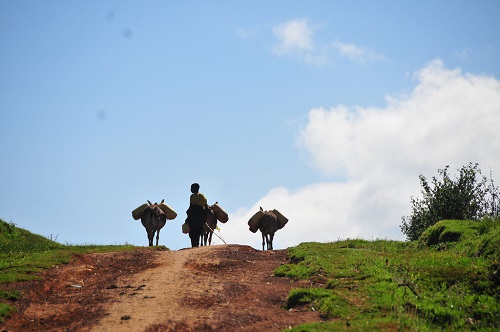MPFAO photo
By
Alpha Jallow
Forestry, wildlife experts discuss Africa’s forests, landscapes and wildlife resources
The 21st Session of the African Forestry and Wildlife Commission (AFWC) of the Food and Agriculture Organization of the United Nations (FAO) commenced earlier this week in Dakar, Senegal, to discuss how to sustainably manage and restore Africa’s forests, landscapes and wildlife resources.
The five-day meeting, which focuses on the theme “Restoring forests, landscapes and wildlife resources: unleashing opportunities for sustainable development in Africa”, is being held simultaneously with the commemoration of the 5th African Forestry and Wildlife Week.
About 200 participants, consisting of Ministers of States, government officials from 30 African countries, heads of forestry and wildlife institutions, officials and experts of regional and international organizations, as well as development partners of FAO, are deliberating on the approach to be pursued in tackling and advancing the sustainable management and restoration of forests, landscapes and wildlife resources in Africa.
The delegates are also discussing recent developments in the field of Sustainable Wildlife Management in Africa as well as the role and contributions being made by the related African Union and countries’ strategies and initiatives “and the Collaborative Partnership on Sustainable Wildlife Management” in addressing these issues in the region.
The session aims to give prominence to the critical importance of sustainable management and restoration of forests and wildlife resources in enhancing food security and nutrition, reducing poverty, preventing and combating land degradation and desertification, and adapting to and mitigating impacts of climate change.
The participants are examining and reviewing ongoing sustainable management and restoration programmes, recent developments, challenges and opportunities such as the Green Climate Fund and the way forward to boost the contributions of forests and wildlife resources to the Sustainable Development Agenda in the region.
Hiroto Mitsugi, FAO Assistant Director-General, Forestry Department, in Rome, stated that “forests, their resources and wildlife are critical for the provision of multiple goods and services essential for human wellbeing and for a healthy environment.”
“They are even more important in dryland ecosystems, such as those prevailing in the Africa region, to address critical issues of land degradation, desertification, mitigation of climate change effects and strengthening the adaptive capacity and the resilience of the people and their agroecosystems,” he added.
A call to increase investment
At the heart of discussion at this session is the concept of ‘Building Resilience of Africa’s Drylands and Livelihoods’ and the call to increase investments in sustainable management and restoration of Dryland Forests and Agro-silvo pastoral Systems in the region.
The Session will discuss the Organization’s support to the African Forest Landscape Restoration Initiative (AFR100) through the work it is carrying out on Forest and Landscape Restoration, including the Great Green Wall.
According to Mr Hiroto, AFR 100 is “a call for creating an African movement to heal Planet Earth, to heal Africa’s forests and landscapes resources.”
A new and special edition of FAO’s “Nature & Faune” journal compiling case studies and articles on restoration in Africa, is being launched at the meeting.
In order to underscore the benefits that can be generated by public and private sector investments in sustainable forest management and restoration, the Government of Senegal is hosting the celebration of the World Day to Combat Desertification and Drought under the theme “Land has a true value: Invest in it”, on the 20th of June (instead of the 17th June) at the Mbao Forest, the “Dakar lung”, rendering it an African celebration together with local communities.
Another field visit will be organized to the “Bandia Nature Reserve” on the 22nd of June, showcasing another public-private partnership for the restoration of degraded land.
“I’m convinced that only the mobilization at the national, regional and global level and the collaboration between the actors for the management of natural resources will be able to overcome the challenges we face,” said Mame Thierno Dieng, Senegalese Minister of Environment and Sustainable Development.
“The African Forestry and Wildlife Commission (AFWC) remains, in my opinion, a platform for exchange and sharing of experiences essential to achieve this goal,” he added.
Introducing new guidelines
FAO will introduce the recently published “Guidelines for Using Forest Concessions to Manage Public Forests” at the meeting. In addition, and to support countries’ reporting commitments on SDGs implementation, in particular SDG 15, the Session will introduce the process of the Forest Resources Assessment (FRA 2020) while highlighting efforts for reducing reporting burden on countries by streamlining international forest-related reporting.
Stimulating dialogue and exchange of experience and lessons
Dialogues of Heads of Forestry and Wildlife and Events that will be organized during the week will enable delegates to showcase achievements made to date in restoration of forests, landscapes and wildlife resources, including through Africa’s Great Green Wall, and to discuss and share experiences on Sustainable wildlife management and combatting illegal transboundary exploitation and trade of fauna and flora as well as on developing small scale forest enterprises for livelihood improvement and poverty reduction in Africa.
Alpha Jallow
Alpha is a freelance journalist from Dakar, Senegal, having worked for the BBC African Radio service, West Africa Democracy Radio (WADR) and Radio France Internationale (RFI).



No Comments Yet!
You can be first to comment this post!